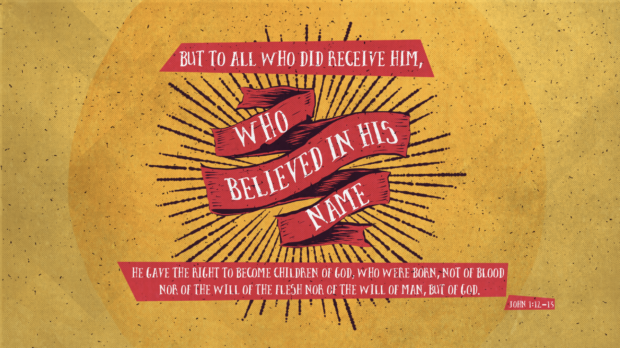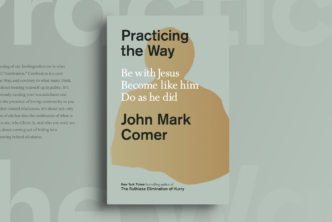“The Bible says that our real problem is that every one of us is building our identity on something besides Jesus.”— Tim Keller
Our identity in Christ may be simultaneously the most important and most ignored part of our spiritual growth. Discovering who God made you to be takes a lifetime. In many ways, it is the ultimate journey of the Christ-follower. Yet many of us just don’t have the patience for a search that we won’t fully complete on this side of eternity.
Let’s face it. Finding yourself—discovering who you are in Christ—isn’t easy. I read a story a few years back that relates to identity, and it has stuck with me ever since.
A group of tourists traveling through Iceland stopped near Eldgja canyon in the country’s southern highlands. One woman left to go change her clothes, but her neighbors didn’t recognize her when she returned. The word passed around quickly that they had a missing passenger. The woman didn’t recognize the description of the missing person, so she joined in the search.
Fifty people searched the canyon. The Coast Guard was even preparing a helicopter to help. But at 3 a.m. the search was called off when searchers realized that the missing woman was in the search party looking for herself.1
Mistaken identity
I feel empathy for the woman. Like I said, it’s hard to find yourself—no matter how hard you’re trying.
It’s particularly a tough search for those of us who grew up in divorced families. Our families of origin play an oversized role in our search for identity.
My parents divorced when I was three. I have no memories of the two of them together. Both of my parents remarried just a few years after their divorce, so I had four sets of extended families. They were great. It’s hard for me to imagine more supportive extended families, but they were very different. No matter how hard people tried to help me fit in, I always felt a bit on the outside.
But family isn’t the only way to try to figure out who you are. I tried all sorts of other ways. The older I got, the more I defined myself by personality traits, skill sets, and through the eyes of my peers.
All those methods came up short.
I now realize all those paths were doomed to fail from the start. I’d like to say that as soon as I committed my life to Christ, I immediately knew who I was. But the Christian life doesn’t work like that. I came to faith in Christ as a child. As a forty-six-year-old, I’m still learning about who I am— who God made to be—every single day of my life.
In this article, I’ll help you take important steps toward discovering who God made you to be in Christ:
- Learn what identity means
- Discover the consequences of getting identity wrong
- Learn what the Bible has to say about our identity
- 20 Key Bible verses about identity
- Understand how to live out your own identity in Christ
What is identity?
Identity is one word we hear often, but we rarely stop to define it for ourselves or for others. But if we’re going to get our identity settled, we need to start with defining what we mean by it.
Part of the reason we struggle to define identity is that it’s kind of nebulous. For example, you’ll find a variety of definitions for identity in secular sources, such as:
- The distinguishing character or personality of an individual (Merriam Webster)
- The condition of being oneself or itself, and not another (Dictionary.com)
- The fact of being, or feeling that you are, a particular type of person, organization, etc.; the qualities that make a person, organization, etc. different from others (Cambridge Dictionary)
But I like how Baker Encyclopedia of Psychology and Counseling describes identity: “In the most general terms identity refers to one’s answer to the question, Who am I? Erik Erikson, the most well-known thinker in this area, proposed that identity involves a sense of personal uniqueness and self-continuity and an identification with group ideals.”
When I write about identity in this post, I’m trying to answer the question: Who am I in Christ?
Consequences of getting identity wrong
Think about how you’ve answered the question, “Who am I?” in the past. I know I’ve responded with many facts about myself, such as my profession, my family background, my birthplace, strengths, weaknesses, etc. But none of those responses really answer the question. The real answer is both simpler and more profound.
We are far more than just what we do, who we see when we look in the mirror, or where we are from. Identity has become a hot topic. Discussions about ethnic identify, gender identity, and more are all over the culture. It’s critical we get this right. But why? How does a misunderstood identity derail us?
- We’ll base our understanding of ourselves on the opinion of others. One of the first places we look for identity is other people in our lives. First, it’s usually our family, then our peers, then romantic partners, etc. Others’ opinions of us are fickle. They change like the wind. It’s unsustainable for us to have an identity that is this shakable.
Plus, nobody knows every part of you. Even those you’re closest to are not privy to every detail about your life. Their opinions of you are based upon incomplete information. Never let anything as fickle and incomplete define something as important as your identity. - We’ll always try to prove our value to ourselves and others. We get a lot of our value from understanding who we are. Part of self-identity is understanding what’s most important to us. When we have a strong sense of identity, we’re likely to have strong self-esteem because we know what our life is aiming toward (so it’s easier to hit that target). But the opposite is also true. We’ll likely struggle with feelings of unworthiness if we’re confused about who we are.
- We will inhibit our ability to build a relationship with others. It’s hard to have relationships with people when you’re constantly looking for them for validation. If you don’t know who you are, you’ll instinctively try to build an identity around other people. That will keep us from the kind of life-giving relationships God wants us to have.
Paul Tripp writes this about the futility of looking to others for identity: “Human relationships are unable to provide us with life, contentment, happiness, and joy, so when we ask them to be our source of identity, it’s only a matter of time before they fail us.” - We will stunt our spiritual growth. Our growth as Christians is based upon our identity.
If we’re always looking to others for our identity and validation, we’ll remain immature in our relationship with God. All Christian growth is a gift of God. We can’t earn it. We can’t create it. It’s a gift that flows from an identity rooted in the death and resurrection of Jesus.
I love how Austin Gentry, pastor to young adults at Second Baptist Houston, describes this in his article on identity and responsibility in spiritual growth: “Spiritual growth means, if we are in Christ, then the truest thing about us is not how much we progress; not how much we grow; not how much we are sanctified. We are not what we do for Christ. We are what Christ has done for us. But in response to our identity of what has been done for us, we ‘do’ for Christ.”
You have a lot riding on your identity. It’s who you are. Get it right, secure it in something (or someone) that doesn’t change, and it’ll bring confidence. It will be your first step in a journey of growth in Christ.
So where can you go to settle your identity?
You really have only one place to look. Our identity begins in the good news Jesus came to proclaim.
The gospel and identity
Identity isn’t tangential to the biblical narrative. It’s at the core of the gospel, the center of the Christian faith. In the very first chapter of the Bible, Genesis tells us God made us in his image and called us to the holy task of caretakers for the earth. But the first couple doubted their identity as image-bearers and disobeyed God in Genesis 3.
Paul declares forcefully in Romans that “all have sinned and fallen short of the glory of God” (3:23). Our identity, the apostle tells us in Romans 5, is tied up with the First Adam and his sin. It’s only by coming to grips with our identity as sinners that we have any hope of a fresh start.
The esteemed New Testament scholar N. T. Wright describes it like this: “The only solution to this far deeper problem is to die with the Messiah, to put to death the old identity, and to find, in rising with him, a new identity in which those distinctions are no longer relevant.”2
We can’t reform the old identity we have in Adam. Our identity in Adam is antithetical to God’s original purpose for us. Instead, we must put our old identity—our fleshly sin-stained identity in Adam—to death with Christ on the cross (Rom 6:5–8), so we may share in his resurrected identity.
That’s the gospel in a nutshell and the starting point for understanding our true identity in Christ.
What does the Bible say about our identity in Christ?

“It is only in God that we discover our origin, our identity, our meaning, our purpose, our significance, and our destiny. Every other path leads to a dead end.”
—Rick Warren, The Purpose Driven Life
Living out your identity in Christ isn’t about what you do. It’s about who you are. You are, as 2 Corinthians 5:17 says, a new creation in Christ. Based upon the gospel truth that you are no longer identified with Adam’s sin, but now with Christ’s resurrected life, the Bible provides us with amazing truths about who we are at this very moment.
For example:
- We were created in the image of God (Gen 1:26). You share this with every human on the planet. You’ll never see a person who isn’t made in the image of God—even when you look in the mirror. You share a likeness with the Creator of the entire universe. You don’t need to feel inadequate because you share a likeness with the Lord himself.
- We are wonderfully made (Ps 139). Nothing about you is a mistake. God designed even the parts of you that bring embarrassment. Your body, your mind, and your soul were all expertly shaped by a loving Creator. No matter how other people see you. No matter how you see yourself. God sees you as well-designed. In his sight, you are the pinnacle of his creative work, beautiful in the eyes of the one who matters most.
- We are loved by God (Rom 8:35–39). You may not feel loved, but you are immensely loved by the Lord himself. The Bible declares that nothing you do will ever take you away from God’s love. You can’t sin enough to make him change his disposition toward you. The one who knows you most loves you most. In fact, the Bible says, “This is how we have come to know love: He laid down his life for us” (1 John 3:16). The cross is the ultimate symbol of God’s great love for you.
- We are a child of God (John 1:12). When we commit our lives to Christ, we become the targets of God’s fatherly love. The Bible says we have been adopted into God’s family (Gal 4:4–7, Rom 8:14–16, Eph 1:5). We are joint heirs with Christ. When you feel unprotected and uncared for, remember you are a child of the King.
- We are a citizen of heaven (Phil 3:20). Our chief identity in Christ isn’t in this world. It’s in the next. We belong to a community of saints that stretches across time and geography. Our priority is with that community.
- We are salt and light (Matt 5:13–14). We are not here to just take up space and live for ourselves. God designed us to brighten and flavor the world around us. We’re to make our world better.
- We are God’s workmanship (Eph 2:10). We display God’s handiwork as we do good in the world out of our uniqueness. We are the canvas on which God pens his love letter to the world.
- We are Christ’s friends (John 15:15). God doesn’t see us as slaves or mere companions. We are friends with the one who colored the sky and carved the mountains. His is a friendship that will last for eternity.
- We are an ambassador of Christ (2 Cor 5:20). God has given us a unique task to be his agents in our world. Like a national ambassador to another country, we are the representative of Jesus to a lost and lonely world. It’s through us that he makes his appeal to people around us.
- We belong to a body of believers that stretches from creation to New Creation (1 Pet 2:9–10). Even if we won’t admit it, we all crave to belong in something bigger than ourselves. The Bible tells us we are—as Israel was before us—a royal priesthood and holy nation. God didn’t just save us from sin, but he called us into his family. Through our identity in Christ, we are connected to believers on every continent, every class, and every stage of life. We may feel alone, but we are part of God’s family, with brothers and sisters who will pray for us and support us in our times of need.
20 Key Bible verses about identity

God’s Word is full of descriptions of the resurrected identity God calls us to embrace. It’s much bigger than the instances where “in Christ” shows up. In fact, God’s perspective on our identity is bigger than just the New Testament. From the first chapter of Genesis, where God makes us in his own image, to the second-to-last chapter of Revelation, where he declares we are conquerors, the Bible constantly clarifies the identity of those who follow Jesus. Below are a few examples of those verses.
All Bible verses from the Christian Standard Bible.
1. Genesis 1:26
Then God said, “Let us make man in our image, according to our likeness. They will rule the fish of the sea, the birds of the sky, the livestock, the whole earth, and the creatures that crawl on the earth.
2. Psalm 139:13–18
For it was you who created my inward parts; you knit me together in my mother’s womb. I will praise you because I have been remarkably and wondrously made. Your works are wondrous, and I know this very well. My bones were not hidden from you when I was made in secret, when I was formed in the depths of the earth. Your eyes saw me when I was formless; all my days were written in your book and planned before a single one of them began. God, how precious your thoughts are to me; how vast their sum is! If I counted them, they would outnumber the grains of sand; when I wake up, I am still with you.
3. Galatians 3:26
But since that faith has come, we are no longer under a guardian, for through faith you are all sons of God in Christ Jesus.
4. John 1:12
But to all who did receive him, he gave them the right to be children of God, to those who believe in his name.
5. John 15:1–5
I am the true vine, and my Father is the gardener. Every branch in me that does not produce fruit he removes, and he prunes every branch that produces fruit so that it will produce more fruit. You are already clean because of the word I have spoken to you. Remain in me, and I in you. Just as a branch is unable to produce fruit by itself unless it remains on the vine, neither can you unless you remain in me. I am the vine; you are the branches. The one who remains in me and I in him produces much fruit, because you can do nothing without me.
6. John 15:15
I do not call you servants anymore, because a servant doesn’t know what his master is doing. I have called you friends, because I have made known to you everything I have heard from my Father.
7. Acts 1:8
But you will receive power when the Holy Spirit has come on you, and you will be my witnesses in Jerusalem, in all Judea and Samaria, and to the ends of the earth.
9. Romans 5:18–19
So then, as through one trespass there is condemnation for everyone, so also through one righteous act there is justification leading to life for everyone. For just as through one man’s disobedience the many were made sinners, so also through the one man’s obedience the many will be made righteous.
10. Romans 8:1–2
Therefore, there is now no condemnation for those in Christ Jesus, because the law of the Spirit of life in Christ Jesus has set you free from the law of sin and death.
11. Romans 8:31–34
What, then, are we to say about these things? If God is for us, who is against us? He did not even spare his own Son but gave him up for us all. How will he not also with him grant us everything? Who can bring an accusation against God’s elect? God is the one who justifies. Who is the one who condemns? Christ Jesus is the one who died, but even more, has been raised; he also is at the right hand of God and intercedes for us.
12. 2 Corinthians 5:17
Therefore, if anyone is in Christ, he is a new creation; the old has passed away, and see, the new has come!
13. 1 Corinthians 1:30
It is from him that you are in Christ Jesus, who became wisdom from God for us—our righteousness, sanctification, and redemption.
14. 1 Corinthians 6:19–20
Don’t you know that your body is a temple of the Holy Spirit who is in you, whom you have from God? You are not your own, for you were bought at a price. So glorify God with your body.
15. Galatians 3:28
There is no Jew or Greek, slave or free, male and female; since you are all one in Christ Jesus.
16. Galatians 5:6
For in Christ Jesus neither circumcision nor uncircumcision accomplishes anything; what matters is faith working through love.
17. Ephesians 2:8–9
For you are saved by grace through faith, and this is not from yourselves; it is God’s gift—not from works, so that no one can boast.
18. Philippians 3:20
Our citizenship is in heaven, and we eagerly wait for a Savior from there, the Lord Jesus Christ.
19. 1 Peter 2:10
Once you were not a people, but now you are God’s people; you had not received mercy, but now you have received mercy.
20. Revelation 21:7
The one who conquers will inherit these things, and I will be his God, and he will be my son.
Finding your identity in Christ
Your identity in Christ isn’t about anything you need to do, but there are things you can do to help you embrace that identity. In other words, your identity in Christ is already who you are. You simply need to live out that identity. These three practices can help you get started.
- Recognize the self-defeating beliefs you’re embracing about yourself. We all have certain beliefs about ourselves that are counter to your identity in Christ and destroy what the Lord wants to do in and through your life. Take stock of the beliefs that guide you. Write down what you tell yourself throughout the day.
Phrases like “I’m ugly” and “I’m dumb” are clearly antithetical to who you are in Christ. But there are other, more subtle, lies we tell our selves.
If I’m going to make a difference in this world, I need a better job.
Something in my past is keeping me from living the life God has for me.
I’m not loveable. God puts up with me, but he doesn’t love me.
Those are lies that do not represent the truth of God’s Word. Write them down and remind yourself that they are not accurate. Then you’re ready for the next step. - Learn what God says about you. Start by looking at the biblical truths that contradict the lies you recognized in step one. Memorize key verses. (Logos Bible study software can aid you in this if you’ve been struggling to make this a part of your spiritual disciplines.) Many of the verses mentioned in this article can help.
Make it a constant practice of your life to discover and internalize what God says about you. Keep a list handy of what you’ve discovered, particularly the verses that relate to the common lies you’re tempted to believe. - Dig deep into your local church. An important part of your identity in Christ is discovering a place where you belong. You are a part of the body of Christ (1 Cor 12:27). You simply can’t embrace who God made you to be without others walking on the path with you.
You won’t understand your identity within the church just by attending on Sunday morning. Learn to share your life with others. Serve faithfully. Give regularly. Most importantly, find a place where you can “rejoice with those who rejoice, weep with those who weep” (Rom 12:15).
Good resources about your identity in Christ
This is only the beginning of your journey toward finding your identity in Christ. The following resources helped me as I worked through this topic. I think they’ll help you, too.
- Who Am I?: Identity in Christ by Jerry Bridges—A classic book about Christian identity, Who Am I? centers on eight true biblical statements about who we are in Christ. Based on the belief that our position in Christ comes with both privileges and responsibilities, the book details a comprehensive description of these eight important characteristics about our identities in Christ. It’s a great book to go through in community as you work out your identity in Christ together with other believers.
- Your Identity in Christ by Neil T. Anderson—Anderson, a longtime professor at Talbot Theological Seminary, tackles the topic as a counselor. This short book is written to help believers find hope, healing, and freedom through living out an authentic identity in Christ. It contains a great list of Scriptures that speak about our identity in Christ. In fact, this list would be a nice checklist to regularly remind yourself of the truths related to who you are in Christ. If you’re looking for a book you can go through one-on-one with someone struggling through this issue, this would be a good choice.
- Mobile Ed: PD101 Our Identity in Christ—Taught by biblical counselor Elyse Fitzpatrick, this two-hour course not only focuses on the attributes of a person whose identity is found in Christ but also helps to unpack some benefits of building your life upon this identity. Fitzpatrick’s clear teaching style makes the content accessible to anyone, regardless of their spiritual background. If you’re looking for a guide on this topic that is thoughtful, compassionate, and biblically faithfully, check this course out.
Conclusion
Shelley Hendrix once wrote, “When you know who you are, you know what to do.” I’m convinced she is right. Like I mentioned at the beginning of this article, I’ve struggled to come to grips with my identity for most of my life. I know I’m not alone. It’s so easy to base our lives on the trivial and the fluid. Not only is that hard on us emotionally and spiritually, but it keeps us from pursuing God’s purpose for our lives, one that he has uniquely crafted for us.
But in the Bible, God urges us to do something different—to base all that we are on his unchanging declarations about how he made us. It’s not a quick fix. It takes time to retrain your mind with the truth about your identity.
It’s worth it though.






